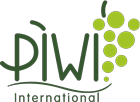CO2 and crop protection savings through PIWI cultivation by Fred Strasser

F. Strasser, Dipl Ing Agr ETHZ, organic plant teacher and M. Coray Contact: fredi-strasser@stammerberg.ch
It was only in the 1980s that science and practice recognized the importance of resistance for environmentally friendly cultivation. As a result, cross breeding and cultivation in pioneering companies increased again with special permits. Switzerland's mandatory list of grape varieties initially prevented free cultivation, which was only legitimized in 1995 by abolishing this list. Today, the goal of creating the most natural vineyard possible using resistant grape varieties is open to every Swiss winemaker. This is important for vineyards where thunderstorms and nighttime dew formations cause the infection pressure of the downy mildew to be very high and make short intervals between the frequent treatments not only necessary in organic winegrowing. This allows a high contribution to the reduction of pollution of soil, air, environment, flora, fauna, winegrowers and the climate.
Produce residue-free wines with PIWI grape varieties from Valentin Blattner

Valentin Blattner, vine grower, Switzerland Contact: valentin@domaine-blattner.ch
SATIN NOIR (VB 91-26-29)
General:
The Satin Noir variety comes from 1991 by Valentin Blattner and is a cross between Cabernet Sauvignon and resistance partners. The variety clearly shows the genetic relationship to Cabernet Sauvignon. The thick berry skin of the small, concentrated aromatic and colorful berries with a loose grape structure are typical of the variety. Also in the vinification, the wines are deep red in a ripe, harmonious Cabernet manner with a ripeness that is about 10 days before the classic grape variety.
Current PIWI grape varieties from HBLA and BA for wine and fruit growing in Klosterneuburg
Donauriesling, Donauveltliner, Muscatel flowers and Pinot nova
Dr. Ferdinand Regner, HBLA Klosterneuburg, Austria
Contact: Ferdinand.Regner@weinobst.at
As breeders of the varieties Donauriesling, Donauveltliner, Blütenmuskateller and Pinot nova, we have a range of varieties that have been selected especially under domestic conditions and come very close to their traditional parent varieties. We were able to convince ourselves of the high level of acceptance of these wines in numerous tastings.
Pioneers honored - 20 years of PIWI International
Katrin Wetzig's report in the newspaper Sarganserland
On Saturday, August 10th, 2019 in Quinten in the “Schifflände” the 39 founders of the “Working Group for the Promotion of Mushroom Resistant Vine Varieties”, or “Piwi International” for short, were honored for their 20-year commitment by presenting a certificate.
Note: You leave our website by clicking on the "Go to Google Photo Album" button.
1st international PIWI symposium on 9.8.2019 in Wädenswil (Switzerland)
Table of contents of the conference proceedings
- The new grape varieties for the 21st century
Prof. Dr. Peter Schumacher, ZHAW Wädenswil - 20 years of pioneering work by PIWI-International eV
Josef Engelhart, President PIWI-International - CO2 and crop protection savings through PIWI cultivation
Fredi Strasser, Dipl Ing Agr ETHZ, organic plant teacher, Switzerland - Current PIWI grape varieties from HBLA and BA for wine and fruit growing in Klosterneuburg
Donauriesling, Donauveltliner, Muscatel flowers and Pinot nova
Dr. Ferdinand Regner, HBLA Klosterneuburg, Austria - Produce residue-free wines with PIWI grape varieties from Valentin Blattner
Valentin Blattner, vine grower, Switzerland - Disease-resistant varieties from VIVAI COOPERATIVI RAUSCEDO
Dr. Asia Khafizova, VCR Rauscedo, Italy - Varieties are not god-given
Thomas Vaterlaus, Vinum Editor-in-chief
Note: You leave our website by clicking on the "Go to Google Photo Album" button.
Plant protection and biodiversity in agro-ecosystems
Statement of the Scientific Advisory Board of the National Action Plan on the Sustainable Use of Plant Protection Products at Federal Ministry of Food and Agriculture
A new terrifying statement on insect decline and bird death in Germany.
If you are still looking for arguments for growing PIWI grape varieties, you will find them on pages 21, 24 and 25. In the opinion, fungus-resistant varieties are presented as the basis for a new integrated crop protection in agriculture:
6.4 Promotion of integrated crop protection processes including the availability, cultivation and market launch of resistant varieties
Integrated plant protection (IPS) measures rely primarily on a variety of methods used to control harmful organisms, such as: B. use of mechanical methods for weed control, use of crop rotation effects, or the cultivation of less susceptible or resistant varieties and adaptation of sowing times to the location. Such measures should be the first choice, but they are not used sufficiently for various reasons. It can be assumed that the use of chemical pesticides is often preferred to alternative methods because they are easy to use and inexpensive and represent conventional practice. We therefore recommend that farmers' training and advice be geared even more strongly towards integrated crop protection than before.
Life cycle assessment of Swiss wine from ÖLN and organic production
Study by Sarah Wettstein, Matthias Stucki, Matthias Meier, Peter Schumacher, Jürg Buchli on behalf of the Federal Office for the Environment (FOEN)
In addition to animal foods, the consumption of alcohol and other luxury foods contributes significantly to the environmental impact of nutrition. In 2014, with 35 liters per capita and year after beer, wine was the most consumed alcoholic beverage. The management of vineyards is associated with a high consumption of resources and energy, as well as with production-related emissions to the air, soil and water. Emissions were reduced with the introduction of integrated production (IP). Organic production goes one step further by banning chemical-synthetic pesticides and increasing the cultivation of fungi-resistant (PIWI) varieties.
The aim of the present study is to assess the environmental impact of wine production in Switzerland with the two production systems mentioned and the cultivation of PIWI varieties using an ecological balance sheet and to highlight the most important influencing factors. In addition, a biodiversity assessment was carried out to show the effects of different production systems on biodiversity.
Fungus resistant grape varieties as a suitable alternative for organic wine production: Benefits, limits, and challenges
Article by Karine Pedneaulta and Caroline Provost in the journal Scientia Horticulturae
Abstract:
Areas dedicated to organic wine production have significantly increased over the last few years. The vast majority of organic wine is made from Vitis vinifera varieties that are highly susceptible to fungal diseases and pests, making organic management difficult for growers. Depending on the growing area, 20-70% of organic growers declare issues with fungal diseases in Europe. Recently, fungus-resistant grape (FRG) varieties have been recommended as the most suitable choice in organic viticulture, especially in areas where disease pressure necessitates high rates of fungicides. FRG varieties could contribute to improved disease management in organic as well as conventional viticulture, reduce production costs and decrease copper accumulation in soils. Recently, many FRG varieties presenting advantageous agronomic attributes and enological characteristics have been developed in North America and Europe for conventional and sustainable farming. In this review, we present an overview of the benefits and limits associated with FRG varieties in addition to the current knowledge regarding berry and wine composition, canopy management, and winemaking challenges and practices.
© 2016 Elsevier BV All rights reserved.
A positive contribution to the carbon dioxide balance
Article by Martin Mehofer in the Austrian trade magazine "Winemaker"
Sustainability is currently a buzzword. In particular, the ecological aspect, which also includes the carbon dioxide balance, is very much discussed in the context of environmental policy. Domestic vineyards alone currently have the potential to bind up to approx. 750,000 t CO2 per year - an enormous contribution to environmental protection, which can still be expanded through an appropriate economy.


